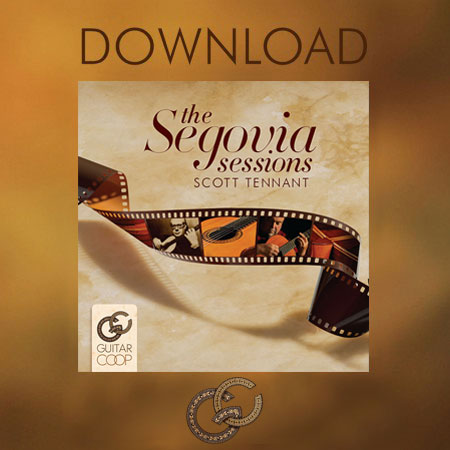The Segovia Sessions
In order to adequately understand the music composed by Andrés Segovia, it is important to remember his life trajectory. Segovia was the greatest guitarist of the twentieth century and his person towers over the history of the instrument with the grandeur of an undisputed monarch. He was the concert performer most admired by the public, most praised by critics and most continuously sought after by promoters. He was also the catalyst for the production of a new and original guitar repertoire: composers (both European and Latin-American) readily and enthusiastically wrote for him.
His quality of life, however, was significantly affected by the exorbitant number of concerts he gave around the world. Few other virtuosos could sustain the burden of a full agenda for seventy-eight years (he gave his first recital in Granada in 1909 and his last in 1987, in Miami, at the age of 94). He dutifully took it upon himself to endure the fatigue and discomfort of his continuous travels, which forced him to spend most of his time in hotels rather than at home. A holiday was considered a luxury that he could concede to only in rare circumstances.
This nomadic and precarious lifestyle gave rise to a curious contradiction. On the one hand, he continued to commission new works from composers, promising performances and recordings. On the other hand, lacking the time to properly dedicate himself to the pieces that arrived, he was often forced to apologize to composers, complaining that he could not study and perform what he wished. We have, thus, two Segovian repertoires: what he could assimilate, play and record (the repertoire he made famous); and what he kept in the shadows, works that were only discovered and published after the start of the new millennium.
How he was able, within such constraints, to write his own brief compositions is a question that can only be answered in light of his inexhaustible creative impetus. It did not matter that the number of works written for him by composers was abundant: something in him demanded a more direct and personal expression.
Among Segovia’s own compositions are the Estudios, the Preludios, the Anecdotes, and the Canciones Populares. Among them is also a curious and recently discovered work entitled Fandango de la Madrugada, written while he was exiled in Montevideo during the Second World War. In this piece, he evokes his distant Andalusia: it is a piece that vibrates with memories of the flamenco that seduced him as a boy, of the sound that struck him even before the discovery of the talent and musical verve that would make him the king of the guitar.
Angelo Gilardino
(English translation: Joe LoPiccolo, revision: David Molina)
ANDRÉS SEGOVIA (1893 – 1987)
01 – Macarena 0’53
PRELUDIOS
02 – Preludio No. 1 0’42
03 – Preludio No. 3 1’04
04 – Preludio No. 4 0’33
05 – Preludio No. 8 1’30
06 – Preludio No. 9 0’41
07 – Preludio No. 10 0’52
08 – Preludio No. 11 1’07
TRES PIEZAS BREVES
09 – I. Canción 1’09
10 – II. Romacillo 2’27
11 – III. Postlude 1’47
12 – Impromptu 1’33
ESTUDIOS
13 – I. Oración 2’26
14 – II. Remembranza 3’06
15 – Estudio Sin Luz 3’06
16 – Prelude in Chords 1’00
17 – Recordando a Deli 2’57
18 – Estudio para Deli 1’30
FOUR EASY LESSONS
19 – Easy Lessons I 0’40
20 – Easy Lessons II 0’33
21 – Easy Lessons III 0’38
22 – Easy Lessons IV 0’22
23 – For Carl Sandburg 0’31
LESSON
24 – Lesson No. 11 1’10
25 – Lesson No. 12 1’04
CANCIONES POPULARES de distintos países
26 – Croata 0’32
27 – Bretona 1’05
28 – Catalana 1’18
29 – Francesa 1’27
30 – Inglesa 1’29
31 – Irlandesa 0’52
32 – Polaca 1’16
33 – Serbia No. 11 0’34
34 – Serbia No. 12 1’22
35 – Rusa 1’26
36 – Fandango de la Madrugada 5’28
TOTAL 50’10
GuitarCoop Store
Mysterious Barricade
Credits
Scott Tennant – The Segovia Sessions
Idealization: GuitarCoop
Recorded at: Camilleri Hall at the Brain and Creativity Institute, University of Southern California. Los Angeles, CA, USA.
Dates: August and December, 2016
Sound Engineering: Kai Narezo
Musical Production: John Dearman
Editors: Everton Gloeden, Ricardo Marui
Mixing: Ricardo Marui
Mastering: Homero Lotito
Texts: Angelo Gilardino, David Collett
Translator: Joe LoPiccolo, David G. Molina
Graphic Desing: Eduardo Sardinha, Patricia Millan
Photos: Felix Salazar Violão / Guitar: 1969 Ramirez “A.M.”, ex Segovia
Strings: Augustine Regal, Red
Microphones: Norbert Pape / Stephen Paul AKG C12, AEA R44CE, Neumann U87, Neumann TLM170r, Pair Neumann KM84, Pair AKG 451 w/ ck28 capsules
Recording System: Apogee Ensemble Interface
Preamplifier: AEARPQ500, Radial PowerPre and Neotek Series 1e
Acknowledgments:
Special thanks to: Ivan Zawinul (Camilleri Hall); Max Brenner; David Norton; Angelo Gilardino; Michael Lorimer; David Collett; Tara Stewart; Stephen Griesgraber and Augustine Strings.


 Português
Português






![O violão clássico é uma peça delicada que exige cuidados especiais para manter sua sonoridade e durabilidade. A madeira, o verniz, as cordas e as diversas peças que compõem o instrumento são sensíveis a fatores externos como umidade, temperatura, poeira e até mesmo o suor das mãos.
Entre os cuidados básicos para mantê-lo em ordem estão a limpeza regular, armazenamento adequado, troca de cordas regular, ajustes periódicos e proteção contra impactos.
Com os cuidados certos, o seu violão clássico terá a sonoridade preservada, aumento da vida útil e manterá o valor - que em muitos casos, é inestimável.
Cuidar do seu violão é um ato de amor pela música. Ao dedicar alguns minutos aos cuidados básicos, você estará garantindo que seu instrumento o acompanhe por muitos anos, proporcionando momentos de alegria e inspiração.
[EN] The classical guitar is a delicate instrument that requires special care to maintain its sound quality and longevity. The wood, varnish, strings, and various components are sensitive to external factors such as humidity, temperature, dust, and even hand sweat.
Basic care includes regular cleaning, proper storage, routine string changes, periodic adjustments, and protection from impacts.
With the right care, your classical guitar will retain its sound, last longer, and maintain its value—which, in many cases, is priceless.
Taking care of your guitar is an act of love for music. By dedicating just a few minutes to basic maintenance, you ensure that your instrument stays with you for years to come, bringing joy and inspiration.
#basiccare #classicalguitar #classicalmusic #guitarcoop](https://guitarcoop.com.br/wp-content/plugins/instagram-feed/img/placeholder.png)





